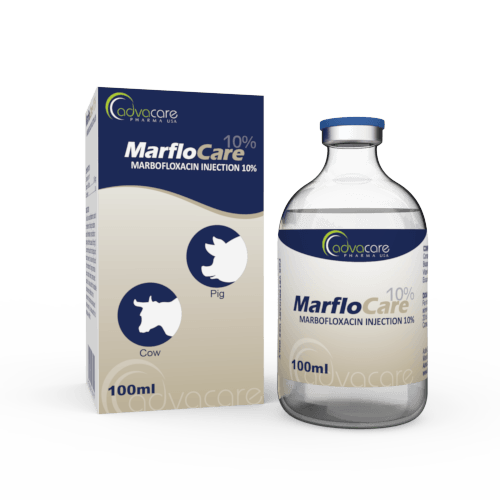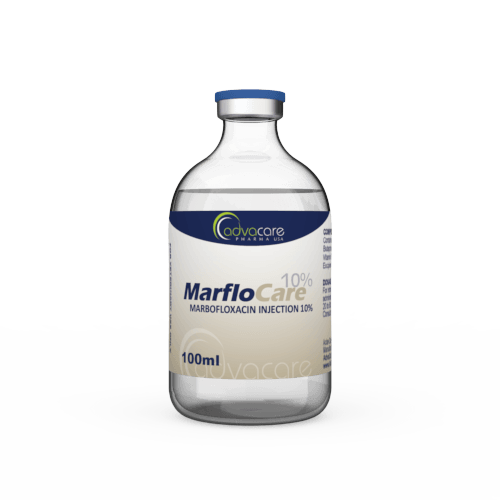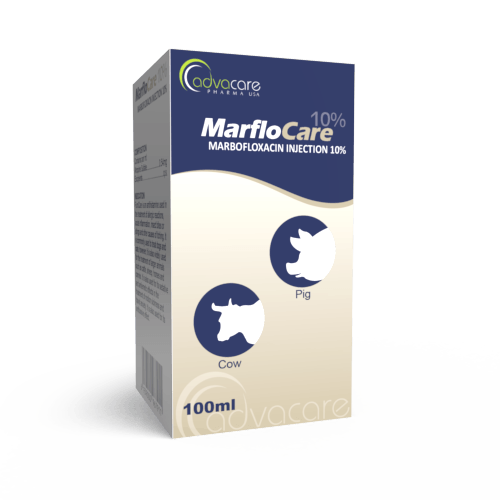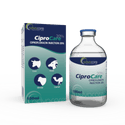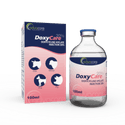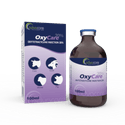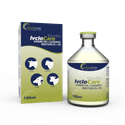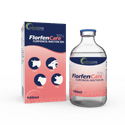- Home›
- Veterinary Pharmaceuticals›
- Veterinary Injections›
- Veterinary Liquid Injections›
- Marbofloxacin Injection
Marbofloxacin Injection
Dosage
Packaging
What is Marbofloxacin?
Active Ingredients: Marbofloxacin
Marbofloxacin Injection is an antibiotic drug used to treat serious bacterial infections in livestock animals like cows and pigs. It is indicated for the treatment of many types of infections, including respiratory infections and mastitis caused by Escherichia coli, and postpartum dysgalactia syndrome.
Marbofloxacin is a synthetic, broad-spectrum antibiotic within the fluoroquinolone family. It works by inhibiting the action of bacterial enzymes, which eventually leads to the death of the bacteria. Marbofloxacin is not effective against anaerobes.
The absorption of this drug is rapid after intramuscular or subcutaneous injection. The blood concentrations peak within 1-3 hours. The bioavailability of this antibiotic is more than 80%. If the animal is treated with certain antacids, veterinarians should be informed because they contain divalent cations such as calcium or magnesium which can decrease the drug’s bioavailability via chelation. Intramuscular bioavailability can be up to 100% but it can be irritating to tissues.
This antibiotic has a high distribution and penetrates to all tissues well and quickly due to the high lipid solubility. Tissue concentrations exceed the plasma concentrations. High concentrations are found in organs of elimination like kidneys, liver, and bile. This drug can also be found in prostatic fluid, bone, endometrium, CSF, and ocular fluid. It also crosses the placental barrier.
Marbofloxacin is excreted by the kidneys through glomerular filtration and tubular secretion. The urine concentrations are high for 24 hours after administration while crystals may form in concentrated acidic urine.
It is important to note that Marbofloxacin Injection is for veterinary purposes only.
AdvaCare Pharma is a trusted global supplier of Marbofloxacin Injections. We offer a wide range of high-quality and cost-effective livestock medications that are available for distribution.
Why are we a trusted Marbofloxacin manufacturer?
Marbofloxacin Injection is manufactured and globally distributed by AdvaCare Pharma, a leading manufacturer of veterinary injections in the pharmaceutical industry. We have been committed to distributing high-quality, GMP-certified veterinary medications for the global market over the past 20 years. As a top Marbofloxacin manufacturer, we ensure that all of our 100+ veterinary injections surpass our distributors' requirements by conducting routine internal and third-party facility audits.
Uses
What is Marbofloxacin used for?
It's used to treat infections such as:
- respiratory infections and mastitis caused by Escherichia coli in cattle
- mastitis and postpartum dysgalactia syndrome in swine
What animals can be treated with Marbofloxacin Injection?
It is recommended for livestock like cows or pigs.
How is a Marbofloxacin Injection used?
This medication has been manufactured as a liquid, which is packaged in a vial. It is intended to be administered by injection. Marbofloxacin Injection is intended for veterinary use only.
Can pregnant animals be treated with Marbofloxacin Injection?
There are no reported teratogenic, embryotoxic, or maternotoxic effects that are associated with this antibiotic. It can be used in pregnant animals only when the benefits outweigh the risks. The benefit/risk assessment should be made by a professional.
Why is Marbofloxacin Injection used in pigs?
This antibiotic is given to pigs for the treatment of various bacterial infections, mainly in the respiratory system or the reproductive system. Marbofloxacin is used for the treatment of Mastitis Metritis Agalactia syndrome and studies confirm its efficacy. One study included 93 sows from 12 locations who were observed for 1 week about their response to antibiotics. This antibiotic shows efficacy in clinical response even on day four. On day 7, this antibiotic shows a success rate in terms of the mortality rate of piglets and the animal’s local tolerance. The results show that Marbofloxacin is well tolerated and has better effects when compared to Amoxicillin in the treatment of Mastitis Metritis Agalactia syndrome in sows.
Why is Marbofloxacin Injection used in cattle?
Marbofloxacin in cattle is used for treating various respiratory infections, mainly those caused by Histophilus somni, Mannheimia haemolytica, and Pasteurella multocida. Studies show that this antibiotic is effective in the treatment process of Bovine Respiratory Disease (BRD). A total of 231 cattle were treated with 2 antibiotics, and one of them was Marbofloxacin. The results showed that Marbofloxacin had a success rate of 85% in the treatment process, and the animals had a good clinical response, time to cure, and overall clinical score.
Is only Marbofloxacin Injection enough to treat BRD?
The control and prevention of this disease is a complex approach. Mixing of new with old animals is not recommended and it should be minimized as much as possible. The transport time also needs to be minimized. New animals should receive vaccinations, metaphylactic antimicrobials, and dust control measures.
In some mild cases, only this antibiotic can lead to a complete recovery, however, in more severe cases, animals need supportive treatment with other drugs and vitamins depending on the current health condition of the animal.
Can this antibiotic interact with other drugs?
Antacids, dairy products, other antibiotics, cyclosporine, flunixin, iron, zinc, methotrexate, nitrofurantoin, probenecid, quinidine, sucralfate, theophylline, or warfarin should be used with caution if the animal is being treated with Marbofloxacin. Veterinarians should also be well-informed about any drugs, supplements, or vitamins that the animals are taking at the moment.
Can other animals besides cattle and pigs be treated with Marbofloxacin Injection?
This antibiotic is also often administered to companion animals like dogs and cats. It is mainly used for treating infected wounds and abscesses. It is also used for treating urinary tract infections and preventing surgical infections.
This specific product is indicated only for cattle and pigs. Consult with a veterinary professional to determine if it can be given to other animals besides cattle and pigs.
How should Marbofloxacin Injection be stored?
This medication should be stored in a dark, dry location under 30°C. The vial should be sealed tightly.
What is the withdrawal period for Marbofloxacin?
The withdrawal time is four days for pigs and six days for pre-ruminating calves. Withdrawal times for most quinolones are not available because they are not approved for use in food-producing animals in most countries. Consult with a veterinarian if you have a food-producing animal.
Dosage
How much Marbofloxacin Injection should be given to livestock?
The usual dose is 1ml/50kg. Any increase in dosage should be supervised by an animal care specialist.
Refer to a veterinary doctor or pharmacist for guidelines on dosage.
Side Effects
As with all pharmaceuticals, some unwanted effects can occur from the use of Marbofloxacin Injection.
Some common side effects may include but are not limited to: • gastrointestinal effects (nausea, vomiting, loss of appetite)
Serious side effects may include:
- allergic reaction
- tremors
In cattle that are treated with intramuscular injections, this drug can lead to local reactions like pain and swelling at the injection site. These lesions may persist for 12 days after the administration. Subcutaneous injections can also lead to pain and localized inflammatory reactions without clinical impact.
Arthropathies might occur due to the treatment with this antibiotic, however, there are no reported serious arthropathies in cattle or pigs.
For a comprehensive list of all possible side effects of this medication, consult a veterinarian.
Precautions
Do NOT use Marbofloxacin Injection for an animal that:
- has a known allergy or hypersensitivity to any of the ingredients.
- has a known allergy or hypersensitivity to other fluoroquinolones.
- is young or growing.
Treatment with this drug should be administered with caution if an animal:
- has hepatic or renal insufficiency.
- has a history of seizures.
- is dehydrated.
People with known hypersensitivity to fluoroquinolones should avoid this antibiotic. Avoid contact with eyes. If accidental contact occurs, flush with water for at least 15 minutes.
If animals develop some side effects due to the injection, it should be reported to a veterinarian as soon as possible.
In case of accidental self-injection or ingestion, affected people should seek immediate medical advice.
What are the most common animals Marbofloxacin is used for?
Marbofloxacin is mainly used to treat bacterial infections caused by susceptible bacteria. This includes treating:
- respiratory infections
- mastitis
- postpartum dysgalactia syndrome
Cow Bacterial Infections
In cows, this antibiotic can be used for treating respiratory infections caused by Histophilus somni, Mannheimia haemolytica, and Pasteurella multocida. It can reduce the lung inflammation and can improve overall respiratory function. It is also used for treating mastitis caused by E. coli or Staphylococcus aureus. It can improve the milk quality and can also reduce inflammation. This antibiotic is also used for treating various gastrointestinal or urogenital infections, as well as skin and soft tissue infections.
Pig Bacterial Infections
Marbofloxacin in pigs can be used for treating respiratory infections as well as for the treatment of Metritis Mastitis Agalactia (MMA) syndrome. Respiratory infections caused by Actinobacillus pleuropneumonia can be treated with this drug. It is also effective against Pasteurella multocida. Streptococcus suis in pigs causes septicemia, meningitis, and arthritis and this drug can help in the treatment process. Various urogenital and skin infections can also be treated with the same antibiotic.
Veterinarians should decide whether the drug is appropriate for the animal’s current health condition. Veterinary professionals also need to perform an antibiogram test to determine whether the bacteria are susceptible to the antibiotic.

You might be interested in...
Why AdvaCare Pharma?
As an industry leader, we are aware of our responsibility to provide affordable and sustainable solutions to improve healthcare worldwide.
